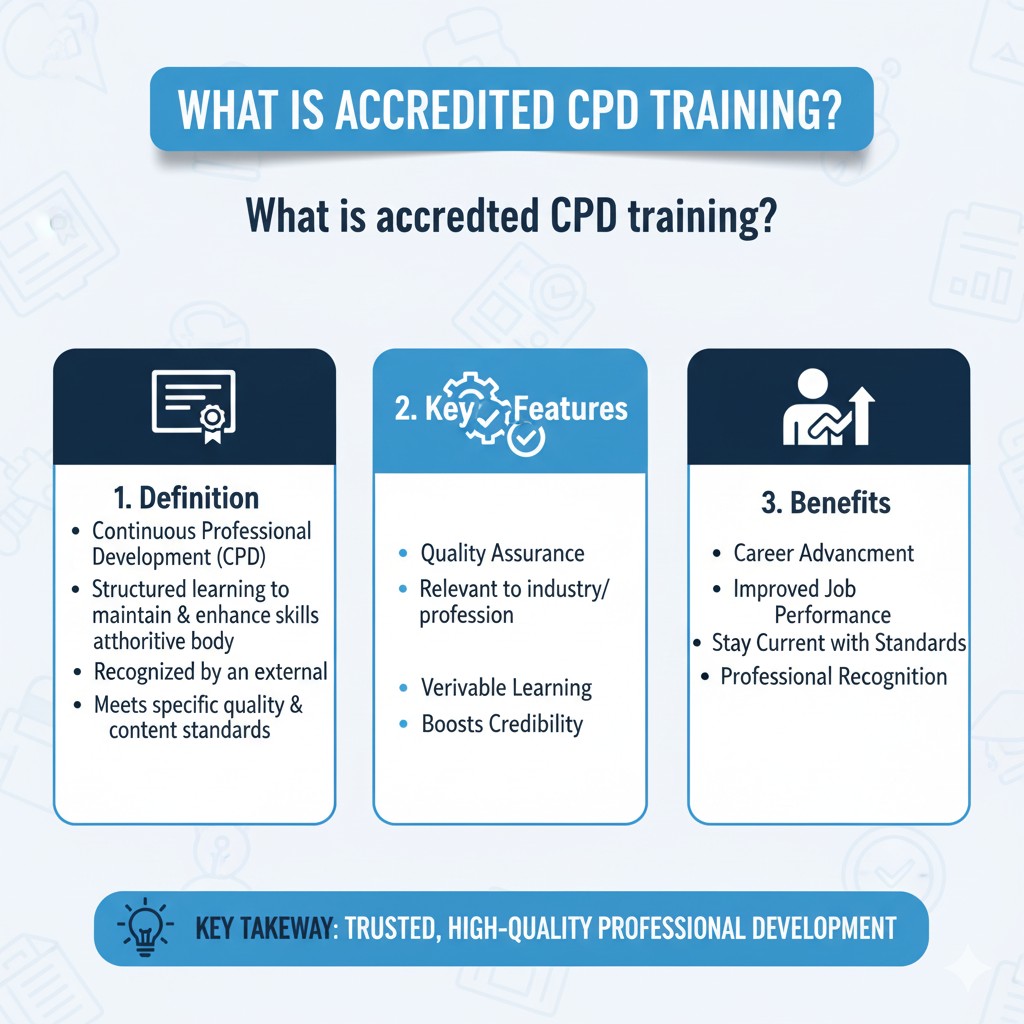
Understanding Accredited CPD
An interactive guide to Continuing Professional Development that's officially recognized for its quality and integrity.
A Mark of Quality and Assurance
This section defines what it means for CPD training to be "accredited." It clarifies that this is not just any training, but one that has been externally verified to meet high standards of educational value and professional relevance.
Definition
Accredited CPD training refers to learning activities that have been independently reviewed and certified by an official accrediting body. This process verifies that the course content, structure, and learning objectives meet rigorous quality standards for professional development.
Essentially, it's a third-party guarantee that the training is credible, up-to-date, and valuable for your career.
The Value of Verification
Explore why seeking out accredited CPD is crucial for serious professionals. This area outlines the key reasons that make accreditation a vital factor in selecting training, from meeting industry requirements to ensuring a genuine return on your investment of time and money.
-
1
Quality Assurance
Accreditation provides an impartial guarantee that the content is accurate, relevant, and delivered to a high educational standard.
-
2
Professional Recognition
Many professional bodies, institutes, and employers require members or staff to complete a certain amount of accredited CPD to maintain their professional status or license.
-
3
Enhanced Credibility
Completing accredited training demonstrates a serious commitment to your profession and personal development, enhancing your CV and professional profile.
Key Benefits for Professionals
This chart visualizes the primary advantages of undertaking accredited CPD. From direct skill enhancement to broader career progression, see how accredited learning translates into tangible professional benefits. Hover over each bar to see the core idea behind each benefit.
Key Differences at a Glance
Understanding the distinction between accredited and non-accredited CPD is key to making informed decisions. This comparison table breaks down the essential differences across various criteria, from quality control to industry recognition.
| Feature | Accredited CPD | Non-Accredited CPD |
|---|---|---|
| Verification | Independently assessed by a third-party body. | Self-assessed by the provider; no external check. |
| Quality | Guaranteed high-quality, structured learning. | Can be inconsistent; quality varies widely. |
| Recognition | Widely accepted by employers and professional bodies. | May not be formally recognized or accepted. |
| Learning Outcomes | Clear, defined, and assessed learning objectives. | Objectives may be unclear or not formally assessed. |
| Value | Provides a verifiable certificate of achievement. | Offers a certificate of attendance, if any. |
Finding Your Course: A 4-Step Guide
Ready to find a quality-assured course? This section provides a clear, step-by-step process to help you identify and verify accredited CPD training providers, ensuring you select a course that is genuinely recognized.
Check with Your Professional Body
Start by visiting the website of your industry's professional body or regulator. They often provide lists of approved providers or specific guidelines on the type of CPD they accept.
Use Official CPD Directories
Websites like The CPD Certification Service or other industry-specific CPD hubs maintain searchable directories of accredited courses and providers across various sectors.
Look for the Accreditation Mark
Accredited providers will display the official logo or "mark" of their accrediting body on their website and course materials. This is a quick visual indicator of quality.
Verify the Provider's Status
If in doubt, you can often cross-reference the training provider on the accrediting body's own website to confirm their accreditation is current and valid.